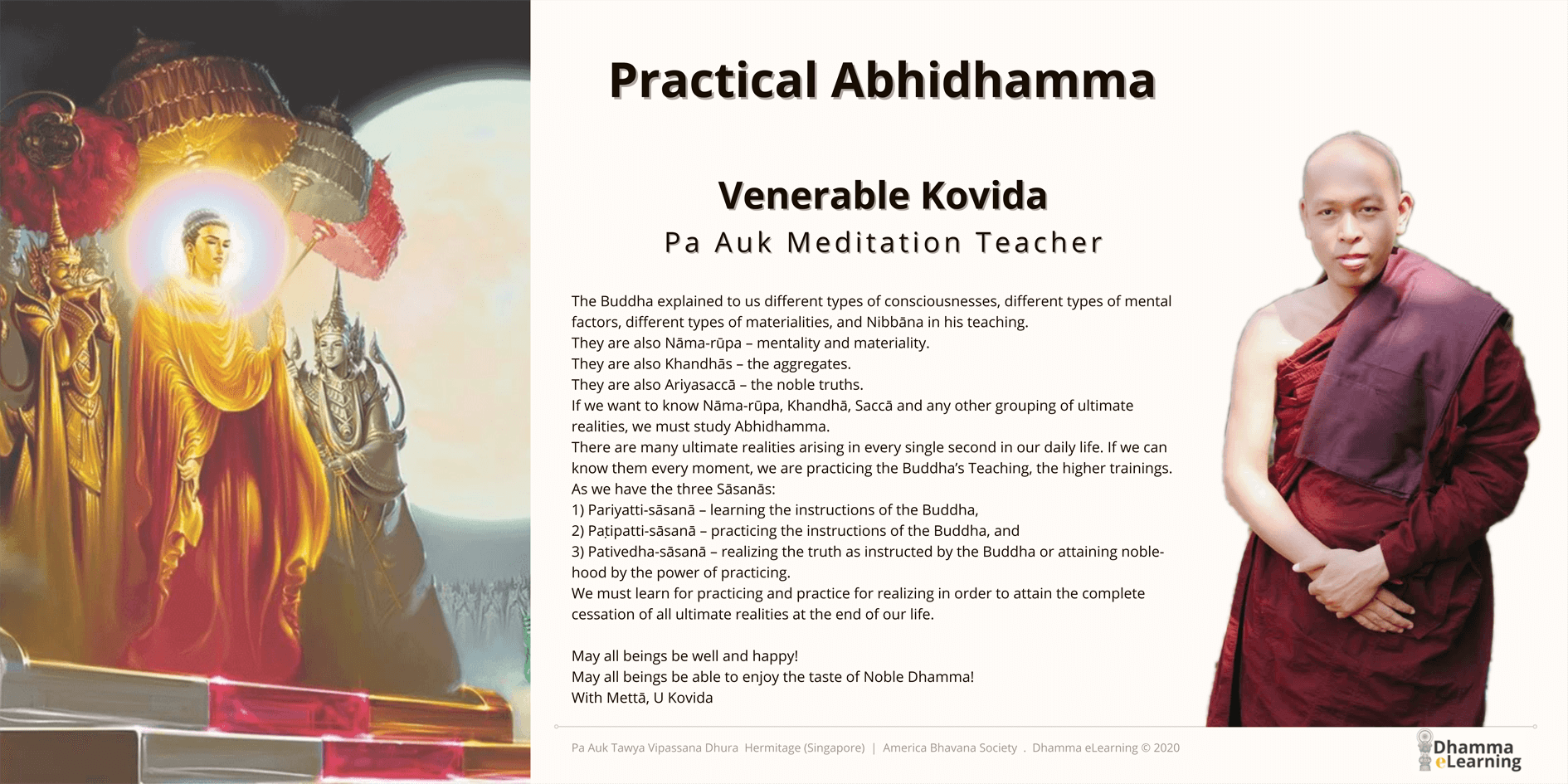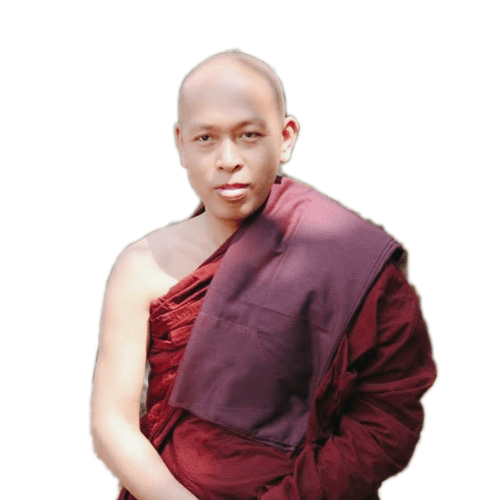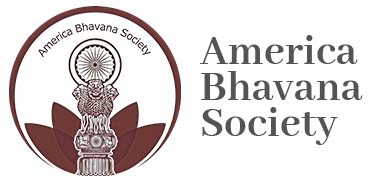
Description
The Buddha explained to us different types of consciousnesses, different types of mental factors, different types of materialities, and Nibbāna in his teaching.
They are also Nāma-rūpa – mentality and materiality.
They are also Khandhās – the aggregates.
They are also Ariyasaccā – the noble truths.
If we want to know Nāma-rūpa, Khandhā, Saccā and any other grouping of ultimate realities, we must study Abhidhamma. There are many ultimate realities arising in every single second in our daily life. If we can know them every moment, we are practicing the Buddha’s Teaching, the higher trainings.
As we have the three Sāsanās:
1) Pariyatti-sāsanā – learning the instructions of the Buddha,
2) Paṭipatti-sāsanā – practicing the instructions of the Buddha, and
3) Pativedha-sāsanā – realizing the truth as instructed by the Buddha or attaining noble-hood by the power of practicing.
We must learn for practicing and practice for realizing in order to attain the complete cessation of all ultimate realities at the end of our life.
May all beings be well and happy!
May all beings be able to enjoy the taste of Noble Dhamma!
With Mettā, U Kovida

About Teacher
- 1976 Sayadaw U Kovida was born in Myanmar.
- 1990 He was ordained as a Samanera at 14 years old.
- 1996 He was ordained as Bhikkhu at Mahāvisutārāma Monastery, Salin.
- 1990-1999 He learned Tipitaka at Mahāvisutārāma Monastery, Salin
- 2000-2003 He further studied at Masoeyein-teikthit in Mandalay and awarded the prestigious title of Sasanadhaja-Dhammacariya.
- 2003-2004 He started teaching Buddhist Scriptures at the same monastery.
- 2006 He practiced under the guidance of Ven. Pa-Auk Sayadawgyi.
- 2008 He started teaching meditation at Pa-Auk Tawya Meditation Centre (Main).
- Sayadaw is fluent in Burmese and English. He has been conducting Meditation Retreats in: Korea (2010), Latvia (2010), Malaysia (2013). He has given Dhamma talks in: Singapore (2010, 2018), Malaysia (2011, 2013, 2017), China, Taiwan (2013, 2018), Indonesia (2013), Thailand. Sri Lanka (2015), Vietnam (2016, 2017, 2018), USA, India, Canada (2018).
What You'll Study
- Chapter 1 Citta – Consciousness
- Chapter 1 Citta – Consciousness
- Chapter 1 Citta – Consciousness
- Chapter 1 Citta – Consciousness
- Chapter 1 Citta – Consciousness
- Chapter 1 Citta – Consciousness
- Chapter 2 Cetasika – Mental Factors
- Chapter 2 Cetasika – Mental Factors
- Chapter 2 Cetasika – Mental Factors
- Chapter 3 Materiality
- Chapter 3 Materiality
- Chapter 4 Mental Process
- Chapter 4 Mental Process
- Chapter 4 Mental Process
- Chapter 5 Kamma
- Chapter 5 Introduction to Paṭiccasamuppāda (Dependent Origination)
- Chapter 5 Introduction to Paṭiccasamuppāda (Dependent Origination)
- Chapter 5 Paṭṭhāna
- Chapter 5 Paṭṭhāna
- Chapter 5 Paṭṭhāna
- Chapter 5 Paṭṭhāna
- Chapter 5 Paṭṭhāna
Chapter 6 Mediation. The Seven Stages of Purification
- Chapter 6 Sīlavisuddhi – The Purification of Morality
- Chapter 6 Introduction to Meditation
- Chapter 6 The Prerequisites of Meditation
- Chapter 6 The Recollection of the Buddha
- Chapter 6 Mettā – Loving-kindness
- Chapter 6 The Ten Repulsiveness Meditations, Recollection of Death, The Four Protective Meditations
- Chapter 6 The Ten Kasiṇas
- Chapter 6 The Four Elements
- Chapter 6 Diṭṭhivisuddhi – The Purification of View
- Chapter 6 42 Body-parts
- Chapter 6 Discerning Mentality
- Chapter 6 Kaṅkhā-vitaraṇā-visuddhi – The Purification of Overcoming Doubt
- Chapter 6 Maggāmagga-ñāṇadassana-visuddhi – The Purification of the Path & Non-Path, Knowledge and Vision
- Chapter 6 Udayabbayañāṇa – The Knowledge of Arising and Perishing
- Chapter 6 Paṭipadā-ñāṇadassana-visuddhi – Practice Knowledge & Vision Purification
- Chapter 6 Bhayañāṇa – The Knowledge of Appearance as Terror, Ādīnavañāṇa – The Knowledge of Danger, Nibbidāñāṇa – The Knowledge of Disenchantment
- Chapter 6 Muñcitukamyatā
Student Requirement
- Basic level. Online self-pace, self-study course
- Approximately two hours per week listening to the lessons. Study and review time will vary depending on one's interest.
- Computer system requirements for taking an online course – Online learning system works well for the following browsers: Microsoft Internet Explorer, Microsoft Edge, Google Chrome, Apple Safari and Mozilla Firefox. We recommend ensuring that your browser version is up-to-date. It supports iOS and Android and should work well on most phones and tablets.
